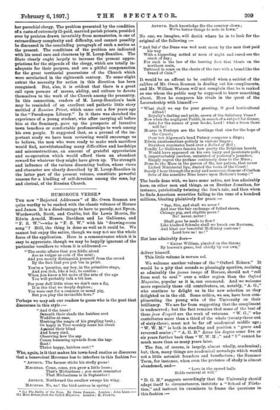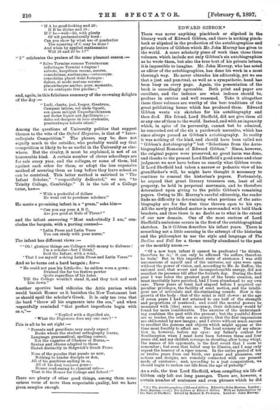HUMOROUS VERSE,*
DIE new " Rejected Addresses " of Mr. Owen Seaman are quite worthy to be ranked with the classic volumes of Horace and James. It is a disadvantage to have to parody, not Byron, Wordsworth, Scott, and Crabbe, but Sir Lewis Morris, Sir Edwin Arnold, Messrs. Davidson and Le Gallienne, and " F. S. W."—who is "F. S. W." with his " drawing-room song" P Still, the thing is done as well as it could be. We cannot but enjoy the satire, though we may not see the whole force of the application. Here is a remonstrance which it is
easy to appreciate, though we may be happily ignorant of the particular versifiers to whom it is addressed :—
" The erotic affairs that you fiddle aloud Are as vulgar as coin of the mint ;
And you merely distinguish yourself from the crowd By the fact that you put 'em in print.
You're a 'prentice, my boy, in the primitive stage, And you itch, like a boy, to confess : When you know a bit more of the arta of the age You will probably talk a bit less.
For your dull little vices we don't care a fig, It is this that we deeply deplore ; You were cast for a common or usual pig, But you play the invincible bore."
Perhaps we may ask our readers to guess who is the poet that discourses in this style :—
" And 0 the trees !
Beneath their shade the hairless coot Waddles at ease, Hushing the magic of his gurgling beak ; Or haply in Tree-worship leans his cheek Against their blind And hoary rind, Observing how the sap Comes humming upwards from the tap- Root !
Thrice happy, hairless coot!"
Who, again, is it that makes his town-bred rustics so discourse that a benevolent Mweenas has to interfere in this fashion P-
" ARTHUR. The farmer sticks his stuffy goose !
MAECENAS. Come, come, you grow a little loose; That's Michaelmas ; you must remember . That Michaelmas is in September !
Airraun. Northward the swallow sweeps his wing. 112EczNas. No, no ! the bird arrives in spring !
• (I,) The Battle of the Bays. By Owen Seaman. London John Lane.— (2.) More Echoes from the Orford Magazine. London : H. Frowde.
Annum. Such knowledge fits the country clown ; We've better things to note in town."
No one, we imagine, will doubt where he is to look for the original of the following :-
" And Sal o' the Dune was wed next moon by the man that paid his way
With a kipperling netted at noon of night and cured ere thu crack of day ; For such is the law of the herring fleet that bloats on the northern main, Tattooed in scars on the chests of the tars with a brand like the brand of Cain."
It would be an affront to be omitted when a satirist of the calibre of Mr. Owen Seaman is dealing out his compliments, and Mr. William Watson will not complain that he is ranked as one whom the public may be supposed to know something
about. Here he compares his rivals in the quest of the Laureateship with himself :—
"What shall we say for your greeting, 0 good horticultural Alfred !
Royalty's darling and pride, crown of the Salisbury Press ? Now when the negligent Public, in search of a subject for dinner, Asks for the names of your books, Lord ! what a boom there will be !
Hearse in Penbryn are the howlings that rise for the hope of the Cymri ; Over her Algernon's head Putney composes a dirge ; Edwin anathematises politely in various lingos ; Davidson ruminates hard over a Ballad of Hell ; Fondly Le Gallienne fancies how pretty the Delphian laurels
Would have appeared on his own hairy and passionate poll I, imperturbably careless, untainted of jealousy's jaundice,
Simply regret the profane contumely done to the Muse ; Done to the Muse in the person of Me, her patron, that never Licked Ministerial lips, dusted the boots of the Court !
Surely I hear through the noisy and nauseous clamour of Carlton.
Sobs of the sensitive Nine heave upon Helicon's hump ! "
The bards done with, we have some satire, not less admirably keen, on other men and things, as on Brother Jonathan, for instance, patriotically twisting the lion's tale, and then when- he finds American securities falling to the tune of a hundred millions, bleating plaintively for peace :-
" Say, Sirs, and shall we sever ?
And mar the fair exchange of fatted steers, Chicago pig, and eligible peers ? No! never, never !
Shall gore be made to flow ?
Like kindred Sohrabs shall we knock our Rustums, And blast our beautiful McKinley customs ? Lord love us ! no !"
Not less admirably does-
" Kaiser William, planted on the throne
By heaven's grace, but chiefly by our own," deliver himself.
This little volume is meram sal.
We welcome another volume of the " Oxford Echoes." It would be a pity that sounds so pleasingly sportive, realising so admirably the jocosa imago of Horace, should not "roll from soul to soul " over a wider region than the Oxford Magazine, popular as it is, can command. And we welcome more especially those old contributors, as, notably, "A. G.," who continue to delight us in the new selection as they delighted us in the old. Some critics, we see, have been com- plimenting the young wits of the University on their brilliancy. We are far from suggesting that the compliment is undeserved ; but the fact remains that some of the best of these jeux d'esprit are the work of veterans. " W. G.," who contributes more than a third of the whole (twenty-three out of sixty-three), must not be far off academical middle age; W. W. M." is both in standing and position a " grave and reverend senior ; " " A. G. B." dates his degree some five or six years further back than " W. W. M. ;" and " " cannot be much more than as many years later.
The fun, of course, is largely, almost wholly, academical;. but, then, many things are academical nowadays which would not a little astonish founders and benefactors ; the Summer Term, for instance, when even the pretence of study is almost abandoned, and—
"Love in the sacred halls Holds carnival at will."
"D. G. H." suggests accordingly that the University should adapt itself to circumstances, institute a " School of Flirta- tion," and instruct its examiners to frame the questions in. this fashion :—
" If A be good-looking and 20 : If B be divine and 18 : If C be—well-50, with plenty Of wit preternaturally keen : Can you show by what use of quadratics The squaring of C may be done ? And when by applied mathematics Will 18 and 20 be 1 ?"
" " celebrates the praises of the same pleasant season :- " Salve Termine summe Terminorum infinitaque Termini volnptas ! salvete, hospitinm recens, sorores, consobrinae, amitaeque,—ceteraeque. consobrina placet domi forisque : dukes, si mode mntuae sorores : placandasque amitas, puer, memento, si vis conloquio frui pnellae ; "
and, again, in this felicitous summary of the crowning delights of the day :—
"Lodi, charts, joci, fragor, theatrum, Campani latices, vel unda Oporti, sen quern mitigat Usquebacchianum ant Sodas liquor aut Apollinaris ;— dulce est desipere in loco studentis, praetextuque laboris otiari."
Among the questions of University politics that suggest themes to the wits of the Oxford Magazine, is that of " Inter- collegiate Competition." The phrase, may be, does not signify much to the outsider, who probably would say that competition is likely to be as useful in the University as else- where. But the rivalry, it must be explained, is not of an honourable kind. A certain number of clever schoolboys are for sale every year, and the colleges, or some of them, bid against each other for them, or adopt the less expensive method of securing them as long before they leave school as can be contrived. This latter method is satirised in " The Infant Scholar," "respectfully dedicated," we see, "to Trinity College, Cambridge." It is the tale of a College
tutor, how-
" With a pocketful of dollars
He went out to purchase scholars."
He meets a promising infant in a "pram," asks him- " Can you say your A B C,
Are you good at Rule of Three ? "
and the infant answering "Most undoubtedly I am," con- cludes the bargain, with a parting counsel— "Latin Prose and Latin Verse
You can study with your nurse."
The infant has different views :— "`Oh ! glorious things are Colleges with money to disburse ! I'm a scholar—but I think,'
Said the Infant, with a wink, That I see myself a-doing Latin Prose and Latin Verse."
And so he turns out a hard bargain ; for-
" He could not pass his Little-Go : he seldom wore a gown : Drained the far too festive pewter
Quite regardless of his tutor Till the College wouldn't stand it, and they took and sent him down."
Another sportive bard ridicules the Attic purism which would banish Homer as it banishes the New Testament lest ne should spoil the scholar's Greek. It is only too true that the bard "threw all his augments into the sea," and when respectfully reminded "that perfect imperfects begin with
an e,"—
"Replied with a dignified air, What the Digamma does any one care ? ' "
this is all to be set right :— " Parents and guardians may surely expect
Books where the student orthography learns, Language grammatical, spelling correct, Not the vagaries of Chaucer or Burns,— Syntax and idioms adapted to those Stated distinctly in Sidgwick's Greek Prose.
None of the puzzles that puzzle ns now, Nothing to hinder disciple or don, All of his genitives ending in ov,
All of his awat Xs-A.:era gone—
Homer conforming to classical rule— That is the Homer for College and School !"
Chore are plenty of other good things, among them some unions verse of more than respectable quality, but we have given samples enough.







































 Previous page
Previous page